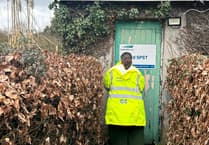MANY of West Devon’s waterways could become designated bathing hotspots in the next 10 years which, it is claimed, will improve water quality standards.
Updating West Devon Borough councillors on the state of the rivers and streams in the area, representatives from South West Water and the Environment Agency said four applications are currently being considered for bathing water status on the River Dart and they expect more inland sites to come forward.
Devon and Cornwall’s beach bathing waters ratings have increased to good or excellent for water quality and South West Water says its priority is keeping them that way.
In West Devon there is an ambition for places like the River Tavy, which are used often for wild swimming and watersports, to be cleaner.
To be designated as a bathing area, 150 people need to be using it for such at any one time. The council’s overview and scrutiny committee was told that this was “quite a hard target”.
South West Water says it is investing money at all of its coastal bathing waters to reduce sewage spills to fewer than 10 on average over a 10-year period by 2030, inland bathing sites to one spill over 10 years and 20 per year from all other storm overflows, with monitors at every site.
The water company, which received the largest ever fine of over £2 million for environmental offences in Devon and Cornwall last year, is investing £3 billion in improvement works over the next 15 years, with representatives talking to communities regularly in an effort to be more “transparent”.
It is looking at more natural-based solutions to deal with water and pollution and hopes to work with local councils on green solutions as well as increasing its amount of reservoir capacity in times of drought.
It is campaigning to stop people flushing wet wipes down the toilet after reporting 7,000 blockages in a year, costing £100 million to clear.
Clarissa Newell from the Environment Agency said West Devon’s rivers were “looking good” compared to the rest of the country, with few serious incidents of pollution. She said there were minor problems caused mostly by agriculture and land management, abandoned metal mines and run-off from development sites.
She said although transparency is good, some data which people can now access, could be interpreted as more serious than it is. Two officers work full-time dealing with Freedom of Information requests.
Alison Stephenson
LDRS





Comments
This article has no comments yet. Be the first to leave a comment.